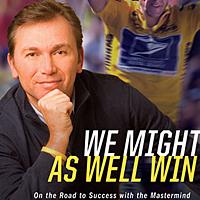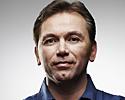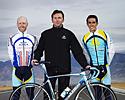
Recently on Cyclingnews.com |
Book review: We Might as Well Win, by Johan Bruyneel, July 10, 2008
We might as well win: A new angle on an old story
Johan Bruyneel's book, We might as well win, written through the pen of cycling journalist Bill Strickland, is best described as seeing something already well known but from a new and rarely-available angle. Cyclingnews' Mark Zalewski rolls up his sleeves and digs into the former Discovery Channel directeur sportif and current Astana team manager's book.
 |
Cycling enthusiasts, and most non-cyclists, (even the sports commentators that do not even think cycling is a 'real' sport,) know the story of Lance Armstrong. Many have gained insight into the seven amazing Tour de France victories through Armstrong's books. Bruyneel's book attempts to allow readers to experience the wins before and after the Lance-era from the place where he spends the majority of his time: the driver's seat of a team car – his proclaimed "office" – as well as inside the team bus, at the team's hotel and points in between.
At times the book is insightful and interesting, giving Lance-junkies likely one of their biggest wishes, to sit shotgun in the Postal or Discovery team car on the ascent of Alpe d'Huez. But at other times, the prose is interrupted with elementary explanations of cycling 101. While it is understandable that Bruyneel (via Strickland) must write to the lowest common denominator of cycling knowledge in order to be inclusive, it only intensifies the already noticeable disconnect between subject and (ghost)writer.
"For the real specialist it is a little simplistic," Bruyneel readily admitted. "That was the easy part, but I wanted to reach a broader audience and that is why it is more broad."
Bruyneel said his thoughts for the book began when the US Postal Service sponsorship concluded, as the team converted to Discovery Channel, and that the seed-planting event set the tone for the book itself. "It came at the end when Postal sponsorship stopped, because I got a request from [USPS] to speak to a select group of employees. They wanted me to use the team's philosophy as an example for running the Postal service. I never did it at the time, but I thought if I could write about it in a book I could explain it a lot better."
"The structure of the book reads more like a Who Moved My Cheese management style guide than a sport biography.". |
Indeed, the structure of the book reads more like a Who Moved My Cheese management style guide than a sport biography. Then again, one of the most common metaphorical duos in writing is the comparison of sport and business. And in that sense, the structure does work.
Though written in the first person, much of the book reads like an interview in a magazine – and I strained to match the Bruyneel I had met in interviews and seen on television with the one speaking to me in the book. There are a few exceptional chapters that avoid this flaw, such as when he talks about his background as a racer and dealing with the death of his father, his number one fan. But I really would have liked to read more of Bruyneel's tone in all of the pages.
Likely the reason for this is how Bruyneel and Strickland wrote the book – out of Bruyneel's verbal recollections of events. "The whole book is out of my head – not out of a diary or notes – just things that are significant. So we had a lot of meetings over the phone and in person. Then we went back and forth and changed some things."
Not driving Miss Daisy
 |
A common theme running through the book is Bruyneel's race caravan driving habits – something for which he has grown infamous. Even I have heard his name broadcast over race radio followed by warnings from both race commissaries and actual Georgia State Patrol troopers regarding his driving... ahem, style. And that theme is turned into a metaphor for how he approaches directing a team; that a few dings and dents, whether in a car fender or rider's ego, are a necessary side-effect on the way to reaching an ultimate singular goal.
Along these lines, I did appreciate the chapter where Bruyneel discusses his thoughts on one of the most frequent critiques leveled against him; that he (and Armstrong) hold grudges against riders who leave the fold or speak against the team's philosophy. Bruyneel even said that one of his hopes for writing this book is to answer the questions people often have about what went on behind closed doors or inside of his head. "I wanted to let people see things that were going on in our minds. That was the most important thing for me."
However, the few times he does delve into the less-positive past of the team he does so only in instances where the end result was a relatively positive tone – as in departures of Levi Leipheimer (who eventually returned, a la the prodigal son) or Max Van Heeswijk.
"Of course it is always hard to see someone leave, because you want the best team. It's going to weaken you and strengthen others, but it's a natural thing and a good sign of a good organization. I almost felt that after a certain performance that rider would not be with us after that year." Put another way, he said, "I've never seen a guy leave our team for less money!"
There are no mentions of darker moments, such as the more publicized separations like Floyd Landis, who claimed negative effects at the hands of Armstrong/Bruyneel, or the reactions to former US Postal rider Frankie Andreu's New York Times mea culpa about systemic doping within the team.
"It was not my goal to try to defend ourselves from anything," he said. "There were some stories that were told, but I saw it another way. There are sometimes just wrong perspectives. We have been criticized so many times that I have given up that battle. When you have some success you get that. Our team became dominant and it had its detractors, so be it. I just explained the ways we did things. If it changes the minds of some people, good, but it wasn't our goal."
"It was not my intention for it to be a self-defense book. The best defense is what we are doing. At least I hope people have another idea of the Postal/Discovery team and the Armstrong/Bruyneel relationship."
When asked what it will be like to work near Andreu as commentator for the American broadcaster of the Tour de France Versus, Bruyneel said, "He must do his own thing and I must do mine. They have different groups of people, so I will be with Craig Hummer and Bob Roll."
Mistakes were made
 |
Bruyneel again tries to clarify controversy in chapter 16, where he admits that signing Ivan Basso was a mistake. However even here I felt that the writing stayed on the surface too much, and not getting into enough details. There is a clear avoidance of anything controversial – and while I understand Bruyneel not wanting to continue negative discussions, there are still many unanswered questions.
"If I wanted, I could have made this a very controversial book. It's actually in my disadvantage to not because the more controversial the more books I would sell! But I didn't want to do that."
Another aspect that people might find lacking, though due to the fact that the manuscript was written and locked well before this, is his new job with Astana. Look for that to possibly be his second book if this first one sells. "I could do another book! It's not such a crazy idea, I am thinking about it, by the way. About everything with politics in sport. I've learned more about that in the last six months than in my whole career."
Overall, this book is a quick and easy read. For the above average cycling fan the book will likely confirm what you already thought went on in the team car, but along with a few surprises too – just skip the primer paragraphs sprinkled throughout each chapter. For the non-cycling enthusiast, or your significant other who constantly asks you things like what 'off the front' means, the tangential breaks to explain what a peloton is or that the smallest rear cog is the fastest will be a welcomed aspect.
For those looking for answers to controversy, or ammunition to continue criticizing Bruyneel (or Armstrong,) you will not find it here. And finally, for the Lance fans craving anything that will give them any type of inside look at the man and his racing career, the book will fit nicely along with his series.
But even if the book does not appeal to any of the above groups and is relegated to half-price bins at Borders, Bruyneel said the experience would still have been worthwhile. "I wanted to do it for myself, to say that I have written a book. And I wanted my daughter to say, 'My dad has written a book!' I would have been happy with just two copies."
Bruyneel, Johan. We Might as Well Win. Boston, New York: Houghton Mifflin, 2008.
Price: $25 USD
Pro: Gives Lance/Postal/Discovery fans a new angle into the inner-workings to satisfy their insatiable hunger
Con: A little too superficial on some of the real questions still lingering
More info: www.johanbruyneel.com

